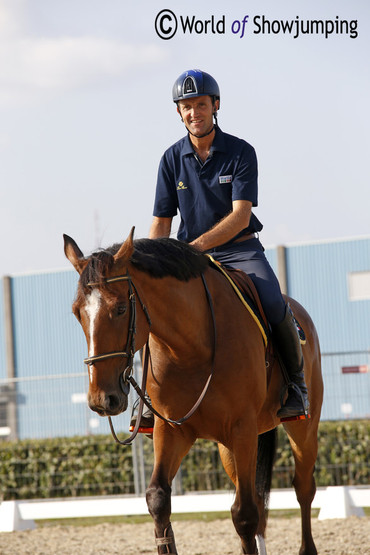
Luca Moneta does things in a different way than most of his fellow competitors. All photos (c) Jenny Abrahamsson.
When we saw Italian rider Luca Maria Moneta riding his top horse Neptune Brecourt bride less in a paddock during Falsterbo Horse Show this summer, we wondered what on earth he was doing. So, in order to find out we sat down with Moneta and let him tell us about his somewhat different approach to riding than that from his fellows competitors. “In the beginning I was laughed at for what I was doing, and I think many thought I was a real idiot. But step by step I think I have gained a little more respect. In the beginning of my international career I was maybe a bit too far from the rest of the riders in my approach to the sport through my philosophy,” Moneta explains.
Let’s start at the very beginning with how Moneta ended up doing things the way he does; “I saw a picture in a news paper of a rider jumping a horse over a barrel bridle less in a field. I was really impressed, and also curious – and thought about how he could do that. I wouldn’t even being able to do the same with a bridle and a saddle. So, I began to read a little – and came over Parelli, that I became a student of. Then I started to study ethology, and I concluded it would be a nice way of getting to the mind of the horses.”
From there Luca started to experiment with the knowledge he had gained. “I began with keeping the most challenging horses, and started to work with them in a different way of training than I had previously done. To me the horses became very responsive to what I was doing and how I was approaching them, so I decided that I must prove that the way I was dealing with the horses also could work in the real world – which meant I started working in the same way also in the sport and with the jumpers,” Moneta explains.
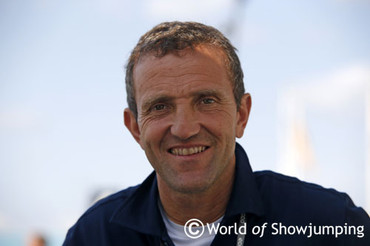
Should you see a rider without a bridle at a five star show; this is the guy - Luca Moneta.
Moneta quickly realized that his philosophy needed to be combined with more serious riding skills, so he decided that he needed a trainer to help him develop with his riding. Seven years ago Moneta started to work with Michel Robert. “Michel was quite fascinated by what I did, and I asked if we could do something together. So, we made a deal – I was to teach him about my philosophy and he would pass on his showjumping knowledge. Of course my job was easier than Michel’s,” Lucca laughs. “I chose the easy student. I am still unable to make a circle in walk,” he jokes.
Luca describes his philosophy as a simple one, and one that tries to avoid what he sees as a culture in the horse world – namely that the way of thinking is “that the horse needs to listen”. Moneta goes on to explain what he means; “The way I see it many riders think that if a horse doesn’t want to do something, you can force it to do it.”
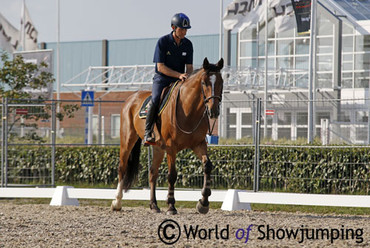
"I try to reach the horse’s emotions; both in their minds and their bodies," Moneta told WoSJ.
“This does not work with all horses. A lot of the horses that come to me are horses that object to such an approach. When they come they rear, buck, run away and have all kinds of trouble. They are in an emotional distress due to fear or because they don’t feel understood. They just say ‘no thank you’. So instead of using my strength against theirs, or going the physical way through riding – I try to reach the horse’s emotions; both in their minds and their bodies. This is the only way I can get the connection I would like with a horse in emotional distress. I don’t use tools – I use my mental connection with the horse to reach what I want,” Moneta explains.
Moneta claims that until now he never found a horse that didn’t enjoy this system. “We have to be aware that a horse doesn’t understand like humans. If you put pressure, pressure and more pressure on the horse only become stressed. And the result of the stress is that the horse gets emotional and offers opposition – because it cannot think clear anymore. I try to give the horse the time it needs, and I work a lot with the horse from the ground. I try to get a conversation, and to understand – offer some task that makes the relation deeper. I always try to see the reason for a problem, and not the problem itself – it is the only way to make the problem disappear. I use the feedback from the horse to understand. I make compromises with my horses; we are partners and we work together.”
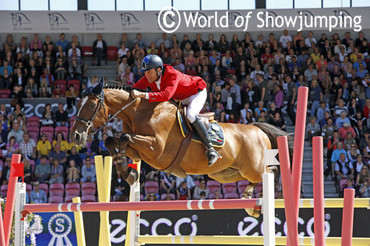
On Neptune Brecourt - once completely unrideable - Luca ended 10th at the European Championships this summer.
No surprise, Luca Moneta has had his fair share of troublesome horses. “I get a lot of extreme horses coming to me of course – I do not really choose the horses I get, I take whatever comes. Sometimes I am the door before the butcher. The horses can be unrideable, they escape, they lie down during riding and things like that. Many of these horses just don’t understand what has been asked of them, and they have reached a level in their minds where you cannot get through to them with regular riding. To me it’s like when humans don’t understand a different language; for example – let’s say you arrive in China. Everybody speaks Chinese to you, but when you don’t understand they only start speaking louder on the edge of screaming. That’s how I think some of the horses that come to me feel,” the Italian rider explains.
Luca tries to give the horses that come to him in such a state of mind something new. “These horses need to be understood. Every time I get a response I let them relax so they feel like there is a conversation. And no one-way screaming.”
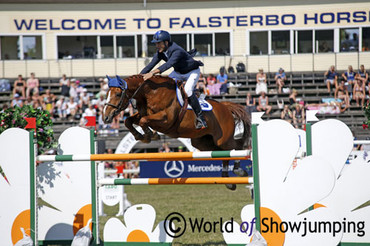
"He was an extremely difficult horse when he came to me," Luca says about Jesus de la Commune.
One of the horses that Moneta’s philosophy definitely has worked on is his super star Neptune Brecourt. Described by Luca as an extreme horse even from he was a foal, the Cumano-son came to Luca at the end of his seventh year. “Neptune was a powerful horse, he could really jump – and he tried very hard. He was careful and had great qualities. But he was completely unrideable, and at the age of seven he had basically no results. His now-owner knew me as he was a student of me, and bought the horse for nothing – and gave it to me to ride. It was a real challenge when he came, and also because I was not the best rider. But we learned together! He has changed so much since I got him five years ago, and he still does,” Luca says adding that he now rides Neptune bride less in a big field, and with connection – in walk, trot, canter, and with tempo changes. “I can now jump small fences without a bridle and he doesn’t run off. This is my way to check that we are in-tune; riding bride less. It’s my way of listening to the horse. Neptune is still very delicate, and still special. I need to stay connected with him.”
Another difficult horse that Luca has had great success on is Jesus de la Commune. “He was an extremely difficult horse when he came to me. Nobody could really ride him. He had top breeding though, and was a super careful horse – but nobody really had a chance with him. I started to work with him to make him to relax. But then when he was relaxed and we started to compete – I had like 22, 24 and 32 faults when I left the ring. So, what I did with him at that point didn’t work in the sport – so I decided to prepare better. And this horse is crazy for food. So I started to play with him when I free jumped him. I was behind the fence with a treat every time after he jumped. In the beginning he didn’t understand, but then he started to realize. Now he calls for carrots after he has done like three or four jumps and still hasn’t gotten anything. When we were jumping the World Cup in Helsinki, he started to call for carrots before we left the ring! Now he is a top horse, and is basically in the top three at all shows he goes to!”
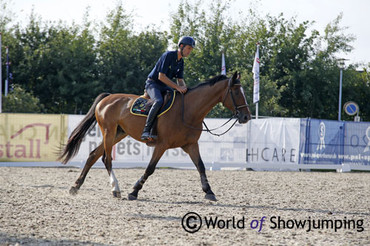
The Olympics in 2016 is Luca's big goal. After that he wants to spend his time on sharing his knowledge.
The relationship Luca gets with a horse is a personal one he tells us. “It does not work to send the horse back when the problem is solved. It’s a personal relation with the horse and me. If it is going to work with the owner after the horse leaves me, then I have to teach both together.”
Luca really wants to prove that his philosophy can work with sport horses at top level; “Now I put all my energy in this towards the next Olympics – just to prove myself. After that I want to change my goal, and share my knowledge and what I have learned. But before I start teaching others I need to have results that show that my philosophy is working – because I see myself as quite the amateur rider compared to my competitors.”
And what about the World Equestrian Games in Normandy next year we ask Moneta? “I was thinking about going to the Games with Neptune – just with a string around the neck, and then hope I end up in the top four with the horse switch. Because there can be no change of bridle,” Moneta laughs as we close off.
Photos by Jenny Abrahamsson/Text by Jannicke Naustdal - copyright © worldofshowjumping.com 2013.








